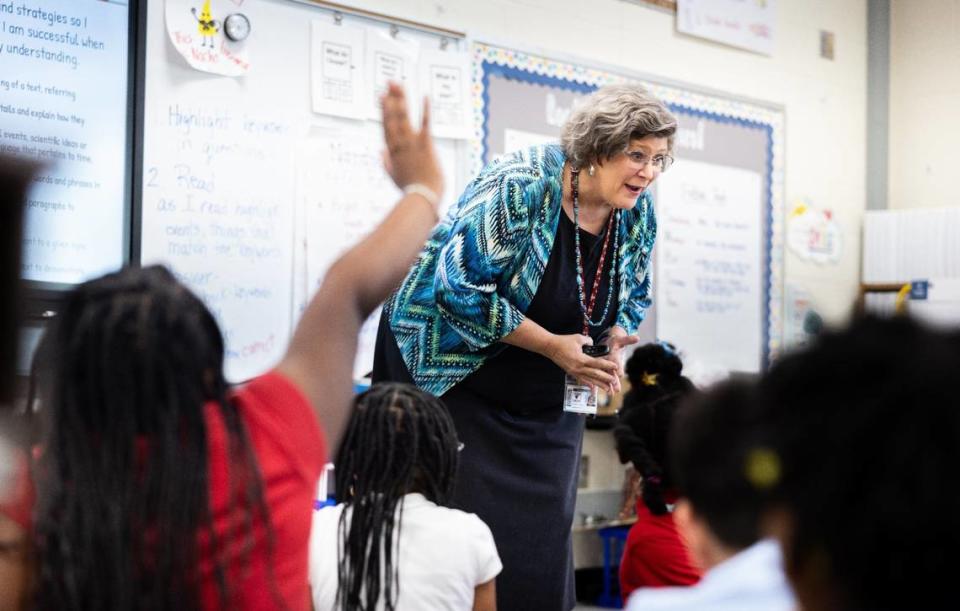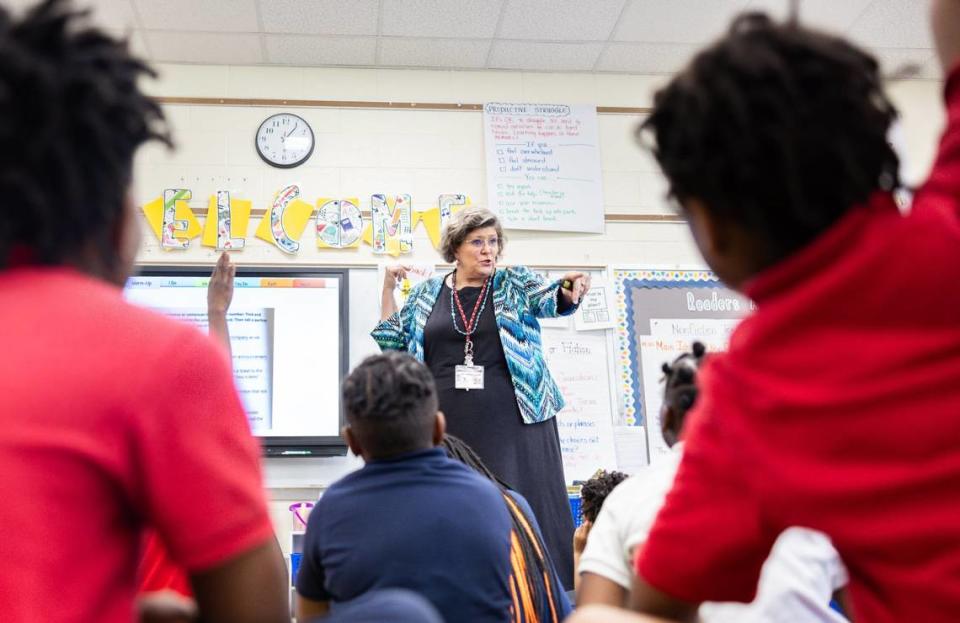Testing, staff shortages plague CMS. But 1 thing hasn’t changed, top teacher says
Elizabeth’s Canute’s third-grade students gave her some sound advice for her acceptance speech when she was nominated for Charlotte-Mecklenburg Schools Teacher of the Year.
“Give us a shout-out,” one student requested.
“Use kind words,” another advised.
“Don’t fall while you’re on stage,” a third said.
Canute laughed it off. She wouldn’t win, she thought. It even took convincing from her principal at Tuckaseegee Elementary to accept the nomination.

So when her name was called at Dale F. Halton Theater at Central Piedmont Community College earlier this month, her jaw dropped. “Oh my God,” she said to the nominees to her left and right. “Oh my God, oh my God!” She swept them each up in a hug – well, as best she could while holding an oversized novelty check from CMS for $500.
“I really was shocked, if I’m being honest,” Canute said of being named Teacher of The Year at the district’s second annual Gem Awards. “I thought, ‘What’s so special about me?’”
LaTresha Wilson, Tuckaseegee’s principal, has known Canute since 2006. She wasn’t shocked about the award at all.
“She’s energetic. She’s conscientious. She’s kind. She’s all-in. You can see her dedication every single day,” Wilson told The Charlotte Observer. “I can go on and on about her. When I think about the epitome of the Teacher of the Year, I think of her.”
Canute sees the honor as the result of a joint effort.
“I don’t look at it as an award for me,” Canute said. “I’m a reflection of everyone I’ve ever taught with. I’ve absorbed the best of everyone I’ve ever worked with, and I now represent them as well as my students.”
After 28 years at Tuckaseegee and 38 years teaching, Canute says there are new challenges, including teacher shortages and what she says is an excessive amount of standardized testing. Still, the core of the job is the same.
“They’re my kids. We joke; we laugh; we have fun,” she said. “It’s always been about a relationship with your students.”
Teacher of the Year from the start?
Canute grew up in Iowa, the daughter of two teachers. As a child, she lined up her dolls and stuffed animals, passed out slate blackboards her dad brought home from work, and taught class.
“I’ve never not wanted to be a teacher,” she said. “This is what I’ve always wanted to be, and my parents always encouraged me.”
She got her teaching degree from the University of Iowa before moving to Jacksonville, Florida, meeting her husband and moving to Charlotte for his job.
Canute’s dedication to her students knew no bounds – including state borders. When her husband was hired by a company in Birmingham, Alabama, Canute continued to teach in Charlotte during the week. She drove 410 miles to Birmingham every Friday and came back to Charlotte for the school week, rather than leave Tuckaseegee Elementary.
She later got her national board certification, which comes with a pay bump in North Carolina.
“As a teacher, you’re always looking for ways you can increase your pay because the salary schedule just is what it is,” she said. “So, I got my national board certification around 25 years ago.”
She now teaches reading to half the 82 third-grade students at Tuckaseegee.
Today’s education challenges

“Who’s going to be Emma Grace today?” Canute asked a group of wide-eyed students sitting on the checkered rug in the middle of her classroom on a sunny Tuesday earlier this month. As summer looms ever closer, so do end-of-grade tests. “Me!” her students sang back, wiggling their hands in the air.
Emma Grace is a little girl who lives on Canute’s cul-de-sac. She’s a curious student who works hard but hasn’t always excelled at test-taking. This year, her hard work paid off, and she passed her tests.
“Now, every time I walk in, I hear her kids saying ‘I’m Emma Grace!’” Wilson said. “And that means they worked hard, and they’re going to pass their end-of-grade tests.”
Canute says half the battle is getting kids to believe they can pass. The other half is the testing itself, which Canute says has gotten excessive.
“Do we need to test students? Absolutely,” she said. “Do we need to test students at any age to this extent? Absolutely not.”
Third graders in CMS are required to take a beginning-of-grade reading test, called a BOG. Students who don’t score as “proficient” on the BOG also take the “Read to Achieve” test. Students also take multiple NC Check-Ins each year to gauge how their learning progresses.
At the end of the school year, third graders take end-of-grade assessments in both reading and math, often called EOGs. Students also take a Cognitive Ability Test, which measures reasoning skills, and potentially the Iowa Test, which measures a students’ skills in reading, language, mathematics, social studies and science. The Iowa Test determines if a child is eligible for the gifted programs at their school.
“We put these kids under the same stress and pressure that we as adults are under with an evaluation or as high schoolers who are going to interview for college,” she said. “My students will sit for three hours and take their end-of-grade reading test, and the students who don’t pass will take a retest a week later, in addition to the math test they will all have to take.”
The students who still don’t show proficiency in the retest will sit for another test a week after that.
All of that is state-mandated. Canute encourages folks who don’t know what testing looks like in schools to volunteer to proctor, including elected officials.
“I need the people in Raleigh to come out of their offices and volunteer before they mandate what my kids need to do, so they have that experience firsthand,” she said. “Then they’ll have the background to make really solid decisions.”
Public education rewards
Canute’s students come from a variety of backgrounds and circumstances at home, and she says the joy of her job comes from relationships with them and their families.
“Some of our students come to us and they’ve experienced more between when they got up at 7 a.m. and when they enter my room at 8:30 a.m. than I may have experienced in my lifetime,” she said. “And that’s true in every urban school district.”
She makes a point to surround students with care and support while they’re within the four walls of her classroom.
“You just have to remind them how much you love and care for them and remind them that hugs are always free,” she said. “We’re a family”
Canute’s learned plenty from her students beyond tips for giving a good acceptance speech. When it comes to resilience, she says they’ve been the ones to teach her.
“I’ve learned to laugh and to cry and that people are persistent, and no matter what happens, we can come back from it,” she said. “I’ve learned that life is full of wonder and we all have a choice: we can give up, give in or get going. And in this class, we’re going to get going.”
Canute was one of nine finalists for CMS teacher of the year. She will now be considered for the regional award, and if named one of the state’s nine regional teachers of the year, she may be considered for North Carolina Teacher of the Year. The state usually names its teacher of the year in April.


